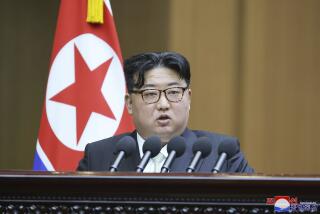‘Statement’ on N. Korea Is OKd
- Share via
SEOUL — The U.S., South Korea and Japan have agreed on a joint statement of principles aimed at coaxing North Korea to renounce its nuclear weapons program, South Korean officials said.
The proposal was hashed out last week at a meeting in Washington of the so-called Trilateral Coordination and Oversight Group. It is to be conveyed to North Korea by Chinese intermediaries this week. The hope is that North Korea will accept the principles as the basis of six-party talks in Beijing this month or early next year.
“We have just agreed on a joint statement. That is quite an achievement in itself. It’s now up to the Chinese and North Koreans to respond,” a senior South Korean official said today, speaking on condition of anonymity.
U.S. officials had been hinting that the next talks would take place Dec. 17, but differences among the allies led to delays in drafting a joint position.
South Korea’s deputy foreign minister, Lee Soo Hyuck, said Sunday that the statement was fairly vague, outlining a “basic framework ... such as the peaceful settlement of the nuclear issue and the need to address North Korea’s security.”
The basic idea is that North Korea would close down all its nuclear facilities -- not only its plutonium production facilities but also a more secretive program to enrich uranium -- and admit international inspectors to verify there’s no cheating. In return, the North would get a guarantee that it would not be opening itself to invasion.
There is much debate, however, about how the nuts and bolts would be implemented. One question is whether the inspectors would come from the International Atomic Energy Agency, which was expelled from North Korea last New Year’s Eve, or if there would be a new inspection regime made up of experts from the U.S., China, Russia, France and Britain.
North Korea has asked for a nonaggression treaty with the U.S. The Bush administration has offered a written security guarantee, but not a formal treaty, and wants it to be made in a multilateral context.
More to Read
Sign up for Essential California
The most important California stories and recommendations in your inbox every morning.
You may occasionally receive promotional content from the Los Angeles Times.













